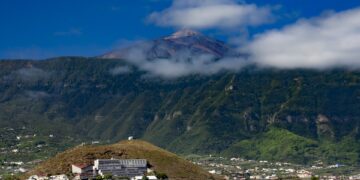
SANTA CRUZ DE TENERIFE, 10 May. (EUROPE PRESS) –
The Superior Chief of the National Police of the Canary Islands, Rafael Martínez, stated this Tuesday that Morocco has begun to control “much more” the departure of small boats and has linked the rebound in recent days to the fact that it seems that “they are the last departures” before the coast is better closed.
In the ‘Conference on Immigration’ organized by the CGPJ and the Government of the Canary Islands, he pointed out that Morocco “does control” of the coast very well with patrol boats “when they receive the appropriate instructions” since “if it were not so” the numbers of departures of boats would be “exponential”.
According to Police figures, throughout this year the number of migrants arriving by boat to the Canary Islands has decreased from 3,194 in January to 375 in March, coinciding with the new diplomatic relationship with the Maghreb country.
Martínez has highlighted that the rapid expulsion of migrants, in just 72 hours, is a “powerful” message against the mafias that organize the trips and represents an “exponential decrease” in the departure of canoes and boats.
Thus, he pointed out that many migrants pay between 1,000 and 2,000 euros to the mafias for the trip and these organizations “do not forgive the debt” despite the return, so the message “sinks” in future migrants who want to jump into the sea.
Martínez has acknowledged that he is still “excited” and “hurts” to see an expulsion of a migrant person because when they climb the stairs of the plane “many dreams go away”, of them and their families, even “of an entire village” who has spent a long time raising the money.
Along these lines, he pointed out that the operation is “complicated” because it involves using two agents on flights to and from the country of origin and, furthermore, it costs a “lot of money.”
He has criticized that “people speak very easily” about immigration and has assured that they cannot “imagine” what it means to travel in a canoe for more than ten days, with 100 people on board and without being able to move.
“You urinate, you defecate and the only movement you make is to throw the one in front because he has died,” he pointed out, stressing that in some cases there are people gangrened by having their legs submerged in urine.
Martínez has commented that when he took office it coincided with the worst moment of the Arguineguín quay, in the south of Gran Canaria –“my soul reached my feet”– to the point that he did not take office until the situation could redirect because there were 2,600 people crowded “in unworthy conditions.”
Now, he explained, “the image of Arguineguín has disappeared but it still exists” since more than half of the boats go there. “It is incredible the people who are leaving their lives, the Atlantic crossing is the hardest,” she added, stressing that the care protocol has improved and is activated at any time.
He pointed out that when the boats leave Morocco, the most normal thing is that they arrive in Lanzarote and Fuerteventura and if they do it from Senagal to Tenerife, and in case of losing the tide, they end up in the Caribbean “turned into corpses”. “They don’t have a chance to come back,” she pointed out.
THE SITUATION IN AFRICA “GOES WORSE”
In addition, he has pointed out that the national police, civil guards and Red Cross workers also suffered from this situation, with PPE suits and more than 40ºC. “They were difficult situations,” she commented.
The same happens with the CIEs, he has indicated, since many are “shabby” and are suffered by both migrants and the police themselves.
Martínez has also appealed to improve asylum because there is a fraudulent modality that “does a lot of damage” and sees the development of the ‘Africa Plan’ as “fundamental” to invest economically in origin “and that Africans do not leave, that they are happy in their countries “, instead of spending on the islands in reception camps for people who “equal to live” here and risk their lives.
Along these lines, he has also said that it is necessary to insist on bilateral agreements, the action of Frontex and a “common visa policy” so that migrants come to work or even study in a regulated manner.
He stressed that the situation in Africa “is getting worse”, especially since 2010 as a result of the Arab spring, to which climate change, corruption, the plundering of natural resources or terrorism are added.
















